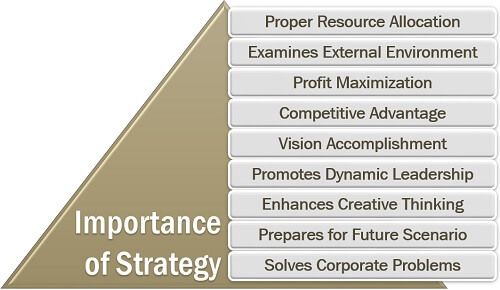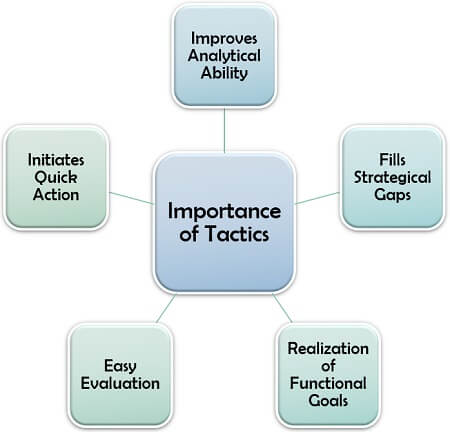Even the top-performing managers consider the terms strategy and tactics as synonyms. Although both are far different from each other. A strategy is a corporate plan developed to competently achieve the company’s vision in the long run, by overcoming various business obstacles. Whereas, tactics are the ways adopted to deal with certain situations which arise during the execution of the strategic plans.
The strategy and tactics are similar in the sense that both are undertaken as problem-solving tools in the organization. The former facilitates managerial decision-making; whereas the latter backs the functional business decisions.
Content: Difference Between Strategy and Tactics
- Difference and Comparison
- Example
- What is Strategy?
- Importance of Strategy
- What are Tactics?
- Importance of Tactics
- Summary
Difference and Comparison
| Basis | Strategy | Tactics |
|---|---|---|
| Meaning | Strategy is the planning of the organization's actions, such that the company's vision is fulfilled. | Tactics are the ways adopted to meet the sub-goals, for the successful accomplishment of the strategy. |
| Answer to | What is to be done? | How to do it? |
| Structure | Unstructured | Structured |
| Formulated by | Senior management | Middle and lower management |
| Comprises of | Whole set of tactics | Procedures and methods |
| Purpose | Attainment of corporate goals | Achievement of functional goals |
| Activity | Planning the action | Performing the action |
| Type of Action | Anticipation | Reaction |
| Scope | Broad | Narrow |
| Approach | General | Situational |
| Vision | Broad | Narrow |
| Key Focus | External factors | Internal factors |
| Time Frame | Long-term | Short-term |
| Orientation | Future | Present |
| Problem Solving Ability | Creative | Analytical |
| Evaluation | Difficult | Comparatively easy |
| Recurrence | Infrequent | Regular |
Example of Strategy and Tactics
The general manager of ABC Ltd. (a bags manufacturing company) analyzed the corporate goal of maximizing sales by 30%. She found that the company has not yet probed the potential of the online market.
Thus, she came up with an online marketing strategy to reach out the mass prospective consumers. This strategy was well communicated to all the middle-level managers.
The marketing manager developed suitable tactics to make this strategy workable. These were as follows:
- Strengthening the marketing channel to ensure timely order delivery;
- Improving the company’s website to include more product information and facilitate direct shopping;
- Registering with popular shopping websites to make the products available to the potential mass buyers;
- Featuring the company’s website advertisements on social media platforms to increase the footfall;
- Facilitating consumer feedback and easy payment modes to enhance their buying experience;
- Running customer loyalty programs and referral discount schemes through email marketing.
What is Strategy?
A strategy refers to the anticipation of future possibilities to smoothly attain corporate goals. At the same time, it steps towards conquering the organization’s vision, in this creative decision-making process.
The strategy can be presumed as a plan to bring about some change for betterment. Or it is taken as a preventive measure to deal with future circumstances.
Importance of Strategy
To know why strategy building is an integral element of any business, let us understand its significance for the corporate world:
Proper Resource Allocation: With a suitable strategy, the management can ensure that every bit of the organization’s resource is put into the best possible use.
Examines External Environment: The company can inspect the external factors like government policies, market demand, competitors, economic conditions well in advance since it creates a significant impact over the business.
Profit Maximization: A strategy aims at improving the overall business operations, thus increasing the sales volume and profitability of the firm.
Competitive Advantage: It is a proactive approach, where the management pre-plans the ways of not only surviving the market competition but also emerging as a powerful brand.
Vision Accomplishment: The ultimate purpose of the strategy formulation is to reach the company’s vision successfully.
Promotes Dynamic Leadership: Leaders are known to have a strategical mindset, since, they can actively figure out the solutions to major organizational issues.
Enhances Creative Thinking: Yes, creativity is the soul of strategic decision making. It emphasizes on analyzing the business goals and determining the ways of attaining these objectives.
Prepares for Future Scenario: An effective strategy formulation helps the organization to remain equipped for future business opportunities, possibilities or conditions.
Solves Corporate Problems: One of the most crucial functions of developing strategy is to deal with the obstacles that impact the overall working of the business units.
What are Tactics?
Tactics are the procedures or the steps taken to ensure the proper execution of the strategic decision. These are the actions taken by the management to realize the sub-goals (heading towards the significant corporate goal realization).
With strong tactics, the company can favourably apply the corporate strategy for business success.
Importance of Tactics
When we have a business strategy, what is the need for tactics?
Tactics make the strategy workable. Its significance for a business organization is discussed in details below:
Improves Analytical Ability: Tactics are applied to work out the problems arising while realizing the functional goals. Thus, it helps the management to develop a problem-solving attitude and instant decision-making capability.
Fills Strategical Gaps: When strategies are put to work, tactics ensure that all the internal factors like personnel, finance, marketing, production, etc. function smoothly.
Realization of Functional Goals: The corporate goal is divided into sub-goals known as functional objectives. Tactics provide procedures to attain these objectives effectively.
Easy Evaluation: The results of carrying out a specific operation or procedure can be immediately assessed, thus, judging the competence of the applied tactics.
Initiates Quick Action: Tactics hold a great significance since it acts as a quick fix for the hurdles that arise during the strategic implementation.
Summary
We have summed up the dissimilarities between both the problem-solving tools mentioned in the above comparison chart, as follows:
- A strategy is a plan which provides direction to win over the major corporate issues. Whereas tactics are the measures taken to make the strategy actionable.
- When the strategy defines the actions that are to be taken; tactics look forward to developing the means of effectively carrying out these actions.
- The former is an unsystematic approach where the managers need to develop intuitive thinking. However, the latter is structured as it targets a particular situation.
- A strategy is a proactive action to resolve an overall organizational problem. On the other hand, tactics are undertaken as a reaction to specific operational issues.
- The former has a broad scope and is applied to the whole business. But the latter is limited to a particular area of the problem.
- A strategy is commonly framed for the whole organization, but tactics are made out of situations or circumstances.
- The former envisions the multiple aspects of the business. On the contrary, the latter takes into consideration a specific situation.
- A strategy focuses on the impact of legal, social, political, environmental, competitive, economic and other external factors over the business. However, tactics deal with internal issues related to labour, technology, production, finance, etc.
- The results of the former can be assessed in the long run. Whereas, the outcome of the latter can be determined in a short period.
- A strategy formulation shields the organization against future possibilities. Tactics, on the other hand, concentrates on the current problem.
- The former nurture the creative thinking ability of a leader. But, the latter brings out the analytical capabilities of a manager.
- It is hard to ascertain the consequences of a specific strategy. However, the result of a particular tactic can be measured immediately.
- The strategy formulation is a big decision which is not incorporated regularly. On the contrary, tactics are the integral part of business operations, undertaken most often.
A strategy without tactics would be like a bow without arrows. Similarly, tactics without a strategy would be just like arrows without any aim to the target.
Semakaleng says
I am so happy about your information. It explained everything that I want.keep it up your good work.